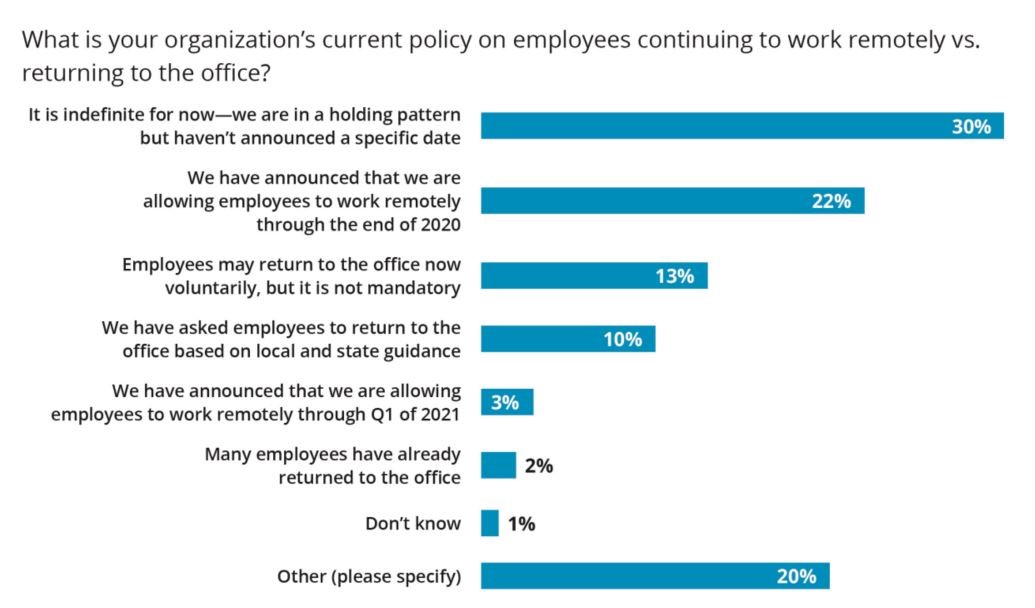Living and Working in COVID-19 Limbo

The just-released results of the Institute for Corporate Productivity’s (i4cp) latest pulse survey—Workforce Policies in Times of Crises—confirm it: We’re working in COVID-19 limbo.
The survey asked, What is your organization’s current policy on employees continuing to work remotely versus returning to the office? A third of respondents (the greatest single group) said things are indefinite at present, that their organizations are in a holding pattern and hadn’t announced a specific date. In other words—limbo.
Next survey question: To what extent is the recent increase in COVID-19 cases across the U.S. affecting your organization’s timeline/decisions on working remotely versus returning to the office? The top response: We are rethinking our approach but haven’t announced anything. Again, limbo.
How many of us feel that we’re in limbo personally as well right now?
Merriam-Webster offers a four-part definition of limbo that pretty brilliantly sums up our world’s current circumstances:
- A place or state of restraint or confinement
- A place or state of neglect or oblivion
- An intermediate or transitional place or state
- A state of uncertainty
Sound familiar? On any given day, one or another—sometimes, all—of those descriptions fit a bit too well.
Limbo offers opportunities
While the definitions cast something of a shadow on the idea of limbo, that doesn’t mean we now find ourselves in an all-negative time. We are certainly challenged at present, but this is also—or can be—a period of opportunity.
On a personal level, we hear of people cleaning out closets, starting new hobbies, switching jobs, re-tooling their landscaping, catching up on household to-do lists, and diving into other constructive projects.
At i4cp, we talk with members and other business leaders every day, learning about the ways they are using this time to turn a lens inward in their organizations and rethink how and where work is done, company policies, corporate culture, organizational values, and more.
Findings from our recently published study, Next Practices in Holistic Well-Being: The Performance Advantage, suggest that the high-performance organizations on which i4cp focuses are using this time to their advantage, too.
We know from our research that market-leading companies place greater emphasis on the whole-person well-being of their workforces and reap business benefits as a result. That holistic approach encompasses physical, mental, financial, community, career, and social well-being.
During this pandemic-induced limbo, leaders in high-performance firms are paying special attention to their well-being programs, practices, and how they might achieve even better results. Especially in the area of mental health (to help workers better cope with the heightened stress of the pandemic, social unrest, and other pressures).
If, like those leaders, you choose to use this time to imagine how your organization might achieve better outcomes for your employees’ mental well-being, review these next practices from i4cp’s well-being research to see what you might apply:

- Train all employees to recognize signs of mental distress in themselves and others
- Encourage (and make it safe for) employees to report concerns about the emotional well-being of themselves and others
- Encourage (and make it safe for) employees to report feeling over-burdened by excessive collaboration requests
- Enable and encourage employees to schedule time daily for meditation, reflection, and/or mindfulness
Taking time now to review your well-being practices and acting to implement some of the strategies that drive positive results for market-leading companies will help ensure that your firm is taking decisive steps to help employees maintain, or enhance, their well-being.
For more information on strategies to strengthen your organization’s workforce well-being outcomes, download i4cp’s Next Practices in Holistic Well-Being: The Performance Advantage. And if you’d like to learn through interactions with other leaders in well-being, explore i4cp’s new Employee Well-Being Exchange working group.






